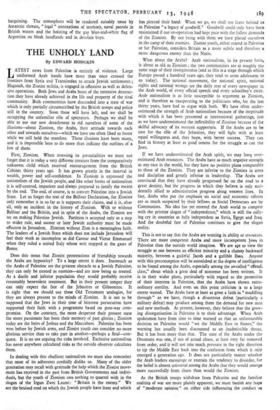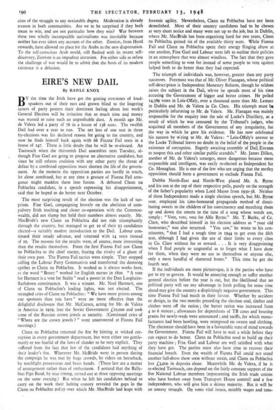THE UNHOLY LAND
By EDWARD HODGKIN ATEST news from Palestine is entirely of violence. Large uniformed Arab bands have more than once crossed the frontiers from Syria and Transjordan to attack Jewish settlements ; Haganah, the Zionist militia, is engaged in offensive as well as defen- sive operations. Both Jews and Arabs boast of the extensive destruc- tion they have already achieved in the life and property of the rival community. Both communities have descended into a state of war which is only partially circumscribed by the British troops and police still in the country. Soon these will have left, and we shall be occupying the unfamiliar role of spectators. Perhaps we shall be able to use our new detachment to rid ourselves of some of the illusions—about Zionism, the Arabs, their attitude towards each other and towards ourselves—which we have too often liked to foster while we still held the mandate. These illusions have been many, and it is impossible here to do more than indicate the outlines of a few of them.
First, Zionism. When assessing its potentialities we must not forget that it is today a very different creature from the comparatively unknown child which received encouragement from the British Cabinet thirty years ago. It has grown greatly in the interval in wealth, power and self-confidence. In Zionism is expressed the nationalism of the Jewish people, and like other forms of nationalism it is self-centred, impatient and always prepared to justify the means by the end. The end, of course, is to convert Palestine into a Jewish State. Let us forget the text of the Balfour Declaration, for Zionists only remember it in so far as it supports their claims, and it is, after all, only an incident in the history of Zionism. With or without Balfour and the British, and in spite of the Arabs, the Zionists are set on making Palestine Jewish. Partition is accepted only as a step to wider rule, and sooner or later Jewish authority must be made effective in Jerusalem. Zionism without Zion is a meaningless faith. The leaders of a Jewish State which does not include Jerusalem will feel their work as incomplete as did Cavour and Victor Emmanuel when they ruled a united Italy whose writ stopped at the gates of Rome.
Does this mean that Zionist protestations of friendship towards the Arabs are hypocrisy? To a large extent it does. Inasmuch as the Arabs of Palestine are the greatest obstacle to a Jewish Palestine, they can only be treated as enemies—and are now being so treated. As a docile and inferior population they would probably receive reasonably benevolent treatment. But in their present temper they can only expect the fate of the Jebusites or Gibeonites. It is right that we should use these Old Testament analogies, for they are always present to the minds of Zionists. It is not to be supposed that the Jews in their time of bitterest persecution have supported their faith with a programme based on post-war com- promise. On the contrary, the more desperate their present state the more passionate has been their memory of past glories ; Zionists today are the heirs of Joshua-and the Maccabees. Palestine has been won before by Jewish arms, and Zionist youth can consider no more glorious service than to take part in another—perhaps a final—con- quest. It is no use arguing the risks involved. Exclusive nationalism has never anywhere calculated risks as the outside observer calculates them.
In dealing with this ebullient nationalism we must also remember that most of its adherents cordially dislike us. Many of the older generation may recall with gratitude the help which the Zionist move- ment has received in the past from British Governments and indivi- duals, but the youth of Zionism sees nothing to quarrel with in the slogan of the Irgun Zwei Leumi: "Britain is the enemy." We are the bruised reed on which the Jewish people have leant and which has pierced their hand. When we go, we shall not leave behind us in Palestine "a legacy of goodwill." Goodwill could only have been maintained if our co-operation had kept pace with the fullest demands of the Zionists. By not being with them we have placed ourselves in the camp of their enemies. Zionist youth, either reared in Palestine or for Palestine, considers Britain as a more subtle and therefore a more dangerous enemy than the Nazis.
What about the Arabs? Arab nationalism, in its present form, is about as old as Zionism ; the two communities are at roughly the same stage of their risorgimentos (and as this is a stage through which Europe passed a hundred years ago, they tend to seem adolescent to us today). The national movement, the national spirit, national rights and national wrongs are the daily text of every newspaper in the Arab world, of every official speech and every schoolboy's essay. Arab nationalism is as little susceptible to argument as Zionism, and is therefore as exasperating to the politicians who, for the last thirty years, have had to argue with both. We have often under- estimated the strength of Arab nationalism because of the ineptitude with which it has been presented at international gatherings, just as we have underestimated the inflexibility of Zionism because of the skilful advocacy of its western supporters. If the Arabs are to be cast for the rOle of the Jebusites, they will fight with at least equal willingness and, they hope, with better success. They can find in history at least as good omens for the struggle as can the Jews.
If we have underestimated the Arab spirit, we may havq over- estimated Arab resources. The Arabs have as much negative strength as any race in the world, but they have no positive plans comparable to those of the Zionists. They are inferior to the Zionists in arms and discipline and greatly inferior in leadership. The Arabs are convinced that they have already progressed far on the road to a great destiny, but the progress in which they believe is only acci- dentally allied to administrative progress along western lines. In fact, Arabs who put the emphasis on social and economic reform are as much suspected by their fellows as Social Democrats are by Communists. No idea has yet entered the Arab world to compete with the pristine slogan of "independence," which is still the rally- ing cry in countries as fully independent as Syria, Egypt and Iraq. And the doubtful fate of Palestine continues to give the slogan reality.
This is not to say that the Arabs are wanting in ability or resources. There are more competent Arabs and more incompetent Jews in Palestine than the outside world imagines. We arc apt to view the struggle as one between an efficient minority and a clumsy backward majority, between a guileful Jacob and a gullible Esau. Anyone with this preconception will be astonished at the degree of intelligence to be found among the Arabs, especially among the so-called " effendi class," about which a great deal of nonsense has been written. It is in their wider plans, particularly with regard to the protection of their interests in Palestine, that the Arabs have shown extra- ordinary sterility. And even on this point criticism is to a large extent wasted. The Arabs have at least as great a faith in "muddling through" as we have, though a disastrous defeat (particularly a military defeat) may produce among them the demand for new men and new methods. At present, however, they believe that the grow- ing disorganisation in Palestine is to their advantage. When Arab spokesmen have from time to time warned us that an unfavourable decision on Palestine would "set the Middle East in flames," the warning has usually been discounted as an inadmissible threat. But it has been more than that. The state of the Arabs under the Ottomans was one, if not of actual chaos, at least very far removed from order, and it will not take much pressure in the right direction to tip the Middle East back into the confusion from which it only emerged a generation ago. It does not particularly matter whether the Arab leaders encourage or restrain the tendency to disorder, for the belief is almost universal among the Arabs that they would emerge more successfully from chaos than would the Zionists.
• As the British troops withdraw from Palestine and the familiar realities of war are more plainly apparent, we must banish any hope of "moderate opinion" on either side influencing the conduct os aims of the struggle to any noticeable degree. Moderation is already treason in both communities. Are we to be surprised if they both mean to win, and are not particular how they win? War between these two wholly incompatible nationalisms was inevitable because neither has ever taken any account of the other. Zionists, from Herzl onwards, have allowed no place for the Arabs in the new dispensation. To the self-conscious Arab world, still flushed with its recent self- discovery, Zionism is an impudent intrusion. For either side to refuse the challenge of war would be to admit that the basis of its modern existence is a delusion.



































 Previous page
Previous page